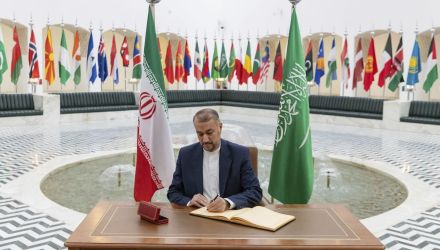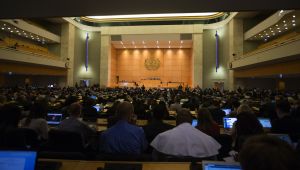"Shadow Government" Blog
The world's nuclear weapons proliferators watch each other. They look for warnings and opportunities in how their peers are treated. Iran halted its nuclear weapons development after Saddam was toppled for several years. Libya's Muammar al-Gaddafi also got cold feet.
Later, Tehran watched the tepid international responses to the 2006 North Korean nuclear test and to a secret Syrian plutonium production reactor (which Israel destroyed as it neared completion in 2007), and apparently decided that the rewards outweighed the risks associated with constructing a covert uranium enrichment facility near Qom.
What are the Mullahs watching now? Syria, where the Obama administration's policy is failing.
U.N. mediator Lakhdar Brahimi reports that the first round of the Geneva 2 peace talks failed even to provide for any humanitarian relief, let alone to make progress toward a political settlement. He lamented that, "We haven't achieved anything." The Assad government then escalated its attacks against civilians by dropping "barrel bombs" packed with explosives and shrapnel on neighborhoods and mosques, continuing a brutal war that has already killed over 130,000 people and displaced millions. Even Secretary of State John Kerry acknowledges that U.S. policy on Syria is failing.
More to the point for Tehran, the effort to destroy Syria's chemical weapons has stalled. Last week, the U.S. representative to the Organization for the Prohibition of Chemical Weapons, Ambassador Robert Mikulak, blasted the Syrian government, noting that only 4 percent of priority one chemicals had been removed, despite a December 31, 2013 deadline for shipping all such materials out of Syria. He went on to accuse Damascus of a "bargaining mentality." Syria's compliance has been belated, incomplete, and grudging. Worse, while the agreement to remove Syria's chemical weapons has stalled, it has also effectively halted international efforts to remove Assad.
The obvious lesson for Tehran: Reach an interim agreement that deflates international pressure for action, drag your feet on implementation, and keep your illicit weapons program as the world dithers.
The stakes in Syria have always been high. The civil war is a humanitarian catastrophe. Its outcome will determine whether or not Iran continues to extend its reach to the border of Israel through its Hezbollah proxies. It will affect prospects for peace and stability in Lebanon and perhaps Jordan. And, it will profoundly influence the outcome of nuclear negotiations with Tehran.
So how are the nuclear negotiations going? President Obama sees the odds of success as no better than 50-50. The six-month interim deal has just gone into effect. It is basically a standstill agreement. It might provide the space necessary to attain a more comprehensive deal, or it could simply be a means to further Tehran's strategy to forestall international action as uranium enrichment centrifuges continue to spin.
Four indicators offer clues as to whether the interim agreement is a path toward real progress or simply a dead-end delaying tactic. First, is Tehran willing to address what the IAEA calls the "possible military dimensions" of Iran's nuclear program? These are activities, procurements, and documents that only make sense as part of a nuclear weapons program. Unless Tehran is willing to satisfy the IAEA's concerns, there can be no confidence that the activities have ended, and with them the nuclear weapons program. Second, is the tone of the negotiations constructive? If the talks descend into diplomatic trench warfare, with every issue hard fought, it will be clear that Iran has not yet made a strategic decision to renounce nuclear weapons, but instead has adopted what Amb. Mikulak called a "bargaining mentality." Third, is a final deal completed within the term of the six-month interim agreement? If Tehran drags out the negotiations as support for sanctions fades, it will become clear that the mullahs have little interest in a real deal. Fourth, have Tehran's illicit procurement efforts ceased? As long as Iran continues to make illegal procurements of nuclear-related materials and equipment, the presumption must be that it will cheat on any deal barring weapons development.
Talks with Iran will resume next week. Recent statements are not hopeful, with Iranian leaders stressing that they have not agreed to dismantle any part of their nuclear program. One point, however, is crystal clear. If the Obama administration cannot compel a weakened Assad government, beset by civil war and subject to international opprobrium for using chemical weapons, to comply with its disarmament obligations, it is unlikely to succeed in dealing with a much stronger Iranian regime. The price of failure in Syria could be a doomed nuclear deal with Iran.
Tobey, William. “Failure in Syria Will Doom Iran Nuclear Deal.” Foreign Policy, February 5, 2014




